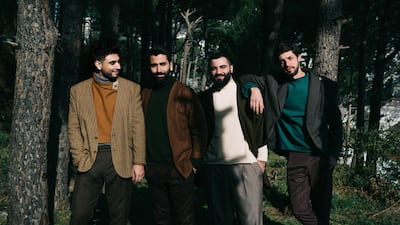When throwing a party in Beirut, be careful of those you don't invite. That's the key takeaway from Adonis's latest song Shukran Al Azimi. The stellar new single is the lead track on the popular Lebanese rock group's new album, 12 Hours, which will be released next month.
The track is powered by organic acoustic guitars and accordion, and you can hear the glasses tinkling as the song's narrator unleashes a bitter riposte for not being called over to the intimate shindig.
Read More
- Byblos Festival 2019: DJ Martin Garrix and Queen Symphonic to perform
- 'Arabs Got Talent': All-female Lebanese dance crew Mayyas take home the prize
- 'Game of Thrones' theme inspires Arab musicians
When The National meets lead singer, keyboardist and chief songwriter Anthony Khoury in Beirut, he explains such situations can cause a minor scandal in these parts. "When you live here you really have to be aware of these things," Khoury explains.
“From weddings and small dinners to wakes, who you don’t invite ends up becoming the subject of conversation the next day. And that’s because we are a small and tight-knit society, this is just a natural occurrence.”
A land of contrasts
Such revealing vignettes are behind the success of the quartet.
Ever since forming in 2011 as students at the American University of Beirut (AUB), the band – named after Khoury’s small hometown in Mount Lebanon – have built a following in the country and the wider region, with relatable tales set to catchy pop rock.
From the title track of their second album, Men Shou Bteshki Beirut, which looks at the existential angst of leaving Beirut for a life abroad, to Stouh Adonis, where Khoury paints a beautiful scene of his younger self and friends having fun on the rooftop of his childhood home, the band are more interested in fostering an emotional connection than rocking out.
“I am more drawn to small stories. I try to write about experiences that a lot of people can easily relate to,” he says. “The situations I mention may be small in scope, but they are often the key to discussing wider issues and feelings that a lot of us experience here in Lebanon.”
Indeed, Khoury, 30, loves his homeland for all its benefits and faults. "It remains my biggest inspiration. It is the drive and the essence of our music and it will be for some time."
A trained architect, Khoury compares the luxurious downtown hotel where we meet to the dilapidated building we can see from the nearby window. "This place is full of contrasts," he says. "When extremes clash in an environment, it creates a tension that can only be inspiring. In Lebanon, you can see within a very small distance big shiny towers and ruined buildings. You will also find people living very comfortably and those struggling. We had war and peace together at the same time. In 2006, we had the war here, things were getting destroyed and in a nearby street people were partying. Such a dynamic setting is bound to inspire you."
That said, Khoury also points to another unlikely location as influential in shaping his personality. When he was 14 years old, his family relocated to Saudi Arabia's coastal city of Dammam for a four-year stint on account of his father's employment.
"It was of course very different than what I was used to, but I loved Saudi Arabia. And that was because I had a shy and reserved nature and I had trouble making friends at school in Beirut; my years in Dammam helped me in sorting out my personality."
Rock and the Arabic language
Upon his return to Beirut, he enrolled in AUB, where he met fellow musician and guitar player Joey Abou Jawdeh. Bonding over their love of American indie-rock and big groups such as Coldplay, they began jamming together and the duo grew to include bassist Gio Fikany and drummer Nicola Hakim.
The resulting chemistry instilled a confidence in Khoury that allowed him to share with the band some of the Arabic lyrics he had been secretly penning over the years.
While the group loved it, there were doubts about whether an Arabic singing rock band would work in the Lebanese market. "It was something that was on our minds because at that time, particularly in the circles that we were in, Arabic music was not really perceived as cool," Khoury says. Yet the group persisted; their brand of sparkling indie-rock and resonant lyrics, sung in the Lebanese dialect, made their 2011 debut album Daw El Baladiyyi a cult success and the next two releases, 2013's Men Shou Bteshki Beirut and 2017's Nour, cemented their place as one of the leaders of the country's thriving rock scene.
Khoury says the band’s stature, not to mention the success of fellow Lebanese group Mashrou’ Leila, proves the Arabic language is versatile enough to accommodate western rock arrangements. The key is in knowing how to finesse it to accommodate the various rhythms.
“This is something that I spend a lot of time on,” he admits. “I work on the syllables to make sure that it fits. Sometimes, it means using different words that perhaps I wouldn’t use in everyday conversation. For example, in one song I was using the word ‘mabsoot’ (happy) in the lyric, but that just felt heavy when you hear it. So instead, I used the more eloquent word ‘farhan’, which means the same thing and that felt right.”
This deeper dive into the nuances of the Arabic language has not only inspired Adonis, but its fan base as well.
“A lot of times I meet people who tell me that thanks to the band, they rediscovered Arabic,” Khoury beams. “That to me is the biggest compliment that we can receive. It means everything to me to hear that.”


